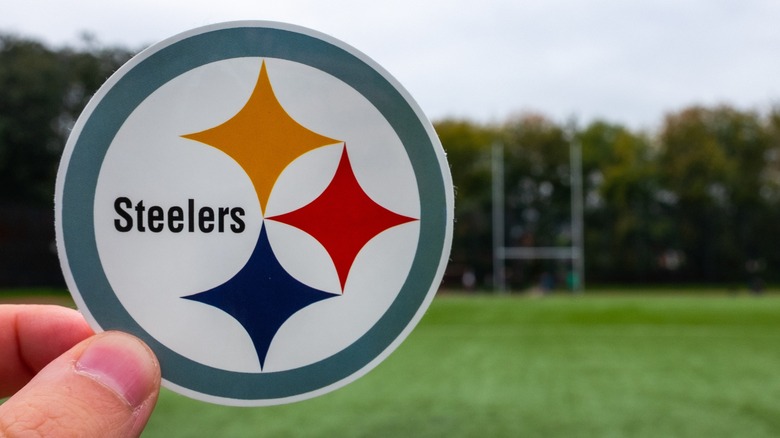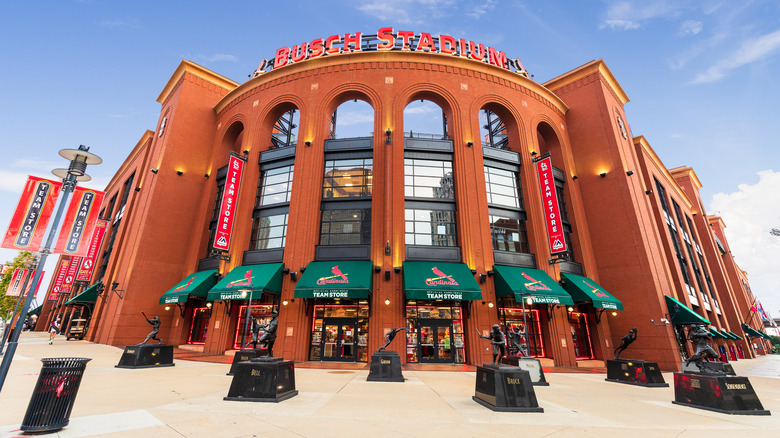Steelers Fans Are Already Fuming And The Season Hasn't Started Yet
Being a sports fan can be painful sometimes, especially if you're a fan of a team that's known for perpetual losing or, at the very least, for going long stretches without championships. But the team's winning and losing on the field is just the tip of the iceberg of ways in which a team's management can annoy its fans. They can trade away or refuse to meet the contract demands of popular players. They can shut out broadcast TV viewers from being able to watch the game at home via complicated contracts with broadcasters. They can neglect the team's home stadium and force the fans to watch in an outdated building. The list goes on.
In July 2022, months before the first snap of the regular NFL season, the Pittsburgh Steelers angered fans by making some changes that are likely to have no appreciable affect on the team's performance on the field. Indeed, the change amounts to little more than words on a page, almost in the strictest possible sense. Nevertheless, sports and sentimentality share a complicated relationship, and when the Steelers' management changed the name of the stadium where the team plays its home games, fans weren't feeling it, according to the Pittsburgh Post-Gazette.
Naming Rights
Corporate sponsorship of sports stadiums is nothing new, but fans have only been complaining about it for a few decades now, thanks to a change in the process that came about in the past 25-30 years.
The St. Louis Cardinals, for example, have been playing in buildings known as "Busch Stadium" since 1953, according to BallParks of Baseball, the most recent iteration of which, depicted above, opened in 2006. Cardinals fans haven't complained about this marriage of baseball and corporate money, largely because the relationship between the Busch corporation (and people named Busch) and the team goes back for decades. Similarly, the Chicago Cubs have played at Wrigley Field — named after its one-time owner who also shares its name with the chewing-gum company he founded — since 1926, according to Major League Baseball.
For the past few decades, however, there's been a trend of corporations that have nothing to do with the team or its history purchasing naming rights for stadiums (per Mental Floss). The Atlanta Falcons, for example, play in Mercedes-Benz Stadium, and the luxury car manufacturer has naught to do with the team (not directly, anyway). Further still, brands that don't have high name recognition with the public are getting in on the action. For example, over in Kansas City, Major League Soccer's Sporting KC plays in Children's Mercy Park, named for a hospital chain, while St. Louis' MLS squad is set to take the field in a stadium named for an insurance company.
Heinz Field Becomes Acrisure Stadium
Since 2001, according to the Pittsburgh Post-Gazette, the Steelers have been playing in Heinz Field. Yes, that's a blatant and obvious example of a corporation using a stadium's name for advertising purposes, but Heinz is a recognizable name in business that produces products that may even be in your fridge as you read these words. Similarly, the Heinz company and the family associated with it have deep roots in the city, as the Post-Gazette notes.
But in 2022, a new corporation purchased the naming rights to the stadium, and it's a head-scratcher — at least in comparison to Heinz. The Steelers will now play in Acrisure Stadium, named for an insurance company "many people have never heard of," writes Adam Bittner. And Pittsburgh fans aren't feeling it.
Over on Twitter, Front Office Sports put up a poll asking fans how they feel about the name change, and the overwhelming majority responded "I hate it!" (Of course, that poll is not scientific.) Another disappointed fan tweeted, "I don't see how anyone could like this. Yeah, it's just a name. But I (and I think other fans, too) kind of liked the days when sponsorship had regional/cultural relevance. Guess those times are over."
"It sucks to have ZERO significance or relation to the city, the region, or its history," wrote another.


